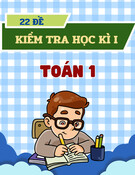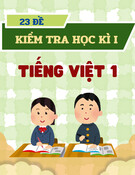
SỞ GIÁO DỤC VÀ ĐÀO TẠO ĐĂK NÔNG
ĐỀ MINH HỌA
--------------------
(Đề thi có _5__ trang)
KIỂM TRA CUỐI KỲ I
NĂM HỌC 2022 - 2023
MÔN: Tiếng Anh 12
Thời gian làm bài: 60 phút
(không kể thời gian phát đề)
Họ và tên: .......................................................................... Số báo
danh: ............
Mark the letter A, B, C or D on your answer sheet to indicate the word whose underlined part differs
from the other three in pronunciation in each of the following questions.
Question 1: A. looked B. laughed C. opened D. stepped
Question 2: A. seat B. leave C. increase D. ready
Mark the letter A, B, C or D on your answer sheet to indicate the word that differs from the other three
in the position of primary stress in each of the following questions.
Question 3: A. precede B. offer C. visit D. finish
Question 4: A. charity B. agency C. origin D. disaster
Mark the letter A, B, C or D on your answer sheet to indicate the underlined part that needs correction
in each of the following questions.
Question 5: I have made all the preparations before you come home tonight.
A. have made B. preparations C. before D. tonight
Question 6:
My sister works for a foreign company in Ho Chi Minh City, where is one of the biggest cities in
Vietnam.
A. for B. in C. where D. cities
Question 7: A good artist like a good engineer learns as much from their mistakes as from successes.
A. like B. as C. their D. from
Mark the letter A, B, C or D to indicate the correct answer to each of the following questions.
Question 8: The conical leaf hat is used like an umbrella to protect people __________ sun or rain.
A. from B. against C. with D. to
Question 9: The ______ of the moon for the Earth cause tides.
A. attract B. attractive C. attraction D. attracted
Question 10: If he had done well on the training course last year, he ________ offered the promotion
now.
A. would be B. would have done C. would be D. will be
Question 11: A new hospital for children_____________ in this area next year.
A. will be built B. will build C. is built D. has been built
Question 12: My car still runs surprisingly well __________ it is over ten years old.
A. but B. in spite of C. though D. despite
Question 13: Tony said he_________20 the following week.
A. would be B. is C. will be D. was
Question 14: Jane ____ law at Harvard for four years now.
A. is studying B. has been studying C. studies D. studied
Question 15: There are a lot of people in Mr. Claire’s office___________ to talk to him.
A. wanting B. to want C. are wanting D. wanted
Question 16: The bus only stops here to ________ passengers.
A. carry out B. get on C. get off D. pick up
Question 17: He came home late, so I asked him where _____________ been.
A. he had B. has he C. he has D. had he
Question 18:
Do you think the coffee
___________
in the highland of Vietnam tastes better than that in
other areas?
A. grown B. is grown C. to grow D. growing
Page 3/5

Question 19: If I had known she was sick, I __________her.
A. visited B. had visited C. would have visited D. would visit
Question 20: There are several means of mass communication. The newspaper is one, television
is ____________.
A. other B. the other C. another D. others
Question 21: The jury __________her compliments on her excellent knowledge of the subject.
A. said B. made C. paid D. gave
Question 22: Tom may get into hot __________when driving at full speed after drinking wine.
A. water B. water weather C. sun D. fire
Mark the letter A, B, C or D to indicate the word(s) CLOSEST in meaning to the underlined word(s) in
each of the following questions.
Question 23: Today, illegal hunting still threatens many species, especially large mammals such as tigers,
rhinoceros, bears and even primates.
A. allowed by law B. forbidden by law C. introducing a law D. imposing a law
Question 24: There are many TV commercials which distracting viewers from watching their favorite
films.
A. economics B. businesses C. contests D. advertisements
Mark the letter A, B, C or D to indicate the word(s) OPPOSITE in meaning to the underlined word(s)
in each of the following questions.
Question 25: I was going to have a go at parachuting but lost my nerve at the last minute.
A. was determined to go ahead B. lost my temper
C. was discouraged from trying D. grew out of it
Question 26: Some vegetables are grown without soil and artificial light.
A. real B. natural C. genuine D. true
Mark the letter A, B, C, or D on your answer sheet to indicate the option that best completes each of
the following exchanges.
Question 27: Peter: “ Your hairstyle is terrific, Cindy” – Cindy: “__________”
A. It’s nice B. You’re welcome
C. Not at all D. Thanks, That’s a nice compliment
Question 28: David is talking to Linda after a party.
- David: “Would you like me to give you a ride home?”
- Linda: “________”
A. That’s be great, thanks. B. Sorry, you’re not my type.
C. Yes, I’m riding home now D. No, thanks. I don’t like riding.
Read the following passage and mark the letter A, B, C, or D to indicate the correct word or phrase
that best fits each the numbered blanks.
Many people think that we can learn a lot about the culture of a foreign country simply by living
in that country. (29)___________, this is not necessarily true. Often the longer we stay in a foreign
country, the more we realize how little we actually know about the culture of that country. Books and
talks about other people’s culture can even be (30)___________ because they concentrate on cultural
differences and exaggerate national characteristics; sometimes a lot of the information (31)___________
is mentioned in these materials is true.
In a survey recently (32)_____________in Britain, people were asked to make a list of any thing
which they thought was typical of Britain and would interest foreign visitors there. Most of
(33)___________ mentioned Shakespeare, the Queen, village inns, English folk dancing, football
hooligans, umbrellas, English castles, cricket and fish and chips.
Question 29: A. So B. Although C. Unless D. However
Question 30: A. harmful B. dangerous C. detrimental D. damaging
Question 31: A. which B. who C. when D. where
Question 32: A. carried out B. come up C. taken place D. worked out
Question 33: A. their B. theirs C. themselves D. them
Page 3/5

Read the following passage and mark the letter A, B, C, or D on your answer sheet to indicate the
correct answer to each of the questions.
Just as you designate and separate your physical workspace, you should be clear about when you’re
working and when you’re not. You’ll get your best work done and be most ready to transition back to the
office if you stick with your regular hours. Plus, if your role is collaborative, being on the same schedule
as your co-workers makes everything much easier.
“The biggest difference between working from home and working in the office is that you are in
charge of your environment and have to treat yourself like an employee,” Yurovsky says. This means
holding yourself accountable, but also recognizing when enough is enough, just as a good manager
might. “If you feel yourself extending your work hours because you are not doing anything in the
evening, tell yourself it’s time to put work away, recharge, and start tomorrow with a fresh mind. The
work will be there in the morning.”
If you live with other people, this separation is even more critical. Communicate with the people
whom you live with to establish boundaries so you can cut down on distractions during the workday—
and then disconnect and give the people you care about your full attention. Having a separate time and
space to work will allow you to be more present in your home life.
(Adapted from https://www.themuse.com/)
Question 34: Which best serves as the title for the passage?
A. Get Your Best Work Done
B. Co-workers Makes Everything Easier
C. Put off Your Work until Tomorrow Morning
D. Keep Clearly Defined Working Hours
Question 35: The word “accountable” in paragraph 2 is closest in meaning to ______.
A. colourful B. responsible C. proficient D. exclusive
Question 36: According to paragraph 1, if you work on the same schedule as your co-workers, your work
may be ______.
A. easier B. more regular
C. readier D. more collaborative
Question 37: What is the useful advice for those who work from home at night?
A. Try to work more as you are free at night
B. Continue working, you are at home
C. Take a rest and come back tomorrow
D. Finish your work now or it will not be there tomorrow
Question 38: The word “whom” in paragraph 1 refers to ______.
A. separation B. boundaries C. people D. attention
Read the following passage and mark the letter A, B, C, or D on your answer sheet to indicate the
correct answer to each of the questions.
Grandparents are becoming the forgotten generation, with youngsters now too busy to listen to
their stories from the olden days.
A study of 1, 000 five to 18 year-olds reveals just 21 per cent will visit their older relatives to hear
about how their lives were different in the past; such as where they worked, how it was living in
the war, and how they met the love of their life. More than half of youths have no idea what job their
grandparent did before retirement - admitting they'd never thought to ask. Sadly, one in 10
admitted they are simply not interested in their grandmother's or grandad's previous job or talents
and interests, and a quarter only turn up to see them for pocket money. But 23 per cent claim the
reason they don't know anything about their older relatives is because they don't really get the
chance to talk properly.
Geoff Bates, spokesman for McCarthy Stone's Inspirational Generation campaign, said: We know this
generation have lived full lives with heroic tales to tell and so much to offer, but how many of us
have actually thought to ask these questions of our older family members? We want to shout about
the amazing feats retirees have achieved in their lifetime and put the spotlight on the wonderfully
colorful lives of today's older people. We are calling on parents and children to talk to their
grandparents, to find out what they have done in their lives - and continue to do, and tell us all
Page 3/5

about it so we can give them the credit they deserve. "
Researchers found that although 65 per cent of youngsters do see their grandparents every
single week, 37 per cent claim this is only because their parents want them to. And while 39 per
cent talk to their grandparents on the phone, Facebook or Skype at least once a week - 16 per cent
once a day - conversation is rarely focused on what they are doing or have done in the past. Four in
10 kids have no idea what their grandparents proudest achievements are, while 30 per cent don't
know if they have any special skills or talents. And 42 per cent don't spend any time talking about
their grandparent's history -and are therefore clueless about what their grandmother or grandad
was like when they were younger. Perhaps due to this lack of communication and respect, just six
per cent of children say they look up to their grandparents as a role model and inspiration. However,
grandchildren are agreed their grandparents are both loving and friendly, while 43 per cent think
they're funny - with 23 per cent admitting they often have more fun with their elderly relatives
than their parents.
(Source: haps: //www. independent. co. uk)
Question 39: According to the study in paragraph 2, which information is NOT true?
A. Merely over one fifth of people in the survey keep asking about the bygone time of their
grandparents.
B. Over 50% of the young don't know about their older relatives' professions before superannuation.
C. Most of youths visit their grandparents to ask for money.
D. Nearly a quarter of young people don't have proper opportunities to converse with their older
relatives.
Question 40: It can be inferred from paragraph 3 that McCarthy & Stone's Inspirational Generation
campaign ______.
A. encourages people to ask more questions about their grandparents' jobs.
B. would like to honour the retirees with their remarkable achievements and experienced life.
C. hopes to give recognition to the older family members,
D. intends to retell the heroic tails of the older generation and find out what they have done in the
past.
Question 41: The word " feats" in the third paragraph is closest in meaning to____.
A. accomplishments B. failures C. difficulties D. differences
Question 42: What does the word "they" in paragraph 3 refer to?
A. parents B. children C. colorful lives D. grandparents
Question 43: According to the last paragraph, the proportion of the young voluntarily visiting
their older family members every week is ______.
A. 37% B. 65% C. 28% D. 39%
Question 44: The word "inspiration" in the last paragraph mostly means ______.
A. disincentive B. encumbrance C. stimulation D. hindrance
Question 45: Which of the following could be the main idea of the passage?
A. Grandparents are outdated people in their families.
B. Young people now do not concern much about their grandparents.
C. Grandparents are not interested in telling stories about their life in the past any more.
D. Young people are too busy to take care of their grandparents.
Mark the letter A, B, C, or D on your answer sheet to indicate the sentence that is closest in meaning to
each of the following questions
Question 46: He last had his eyes tested ten months ago.
A. He didn't have any test on his eyes in ten months.
B. He hasn't had his eyes tested for ten months.
C. He had tested his eyes ten months ago.
D. He had not tested his eyes for ten months then.
Question 47: "Don't forget to submit your assignments by Thursday." said the teacher to the students.
A. The teacher reminded the students to submit their assignments by Thursday.
B. The teacher allowed the students to submit their assignments by Thursday.
C. The teacher ordered the students to submit their assignments by Thursday.
D. The teacher encouraged the students to submit their assignments by Thursday.
Page 3/5

Question 48: During the school year, my parents don’t let me to watch television untiI I have finished
my homework.
A. During the school year, I am not allowed to watch television until I have finished my homework.
B. During the school year, I am allowed to watch television before I finished my homework.
C. During the school year, I don’t have time to watch television until I have finished my homework.
D. During the school year, I allowed my parents to watch television when I have finished
my homework.
Mark the letter A, B, C, or D to indicate the sentence that best combines each pair of sentences in the
following questions.
Question 49: He was very tired but he kept on working.
A. Despite he was very tired, he kept on working.
B. In spite of he was very tired, he kept on working.
C. Though his tiredness, he kept on working.
D. Although he was very tired, he kept on working.
Question 50: You don’t understand the lesson. You keep talking in the class.
A. Unless you paid attention in the class, you won't understand the lesson.
B. I wish you pay attention in the class, you will understand the lesson.
C. As long as you didn’t pay attention in the class, you would understand the lesson.
D. If only you paid attention in the class, you would understand the lesson.
------ THE END ------
Page 3/5






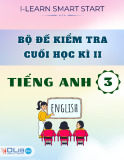
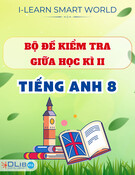

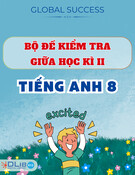
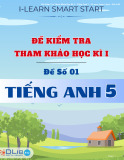

![Đề thi Tiếng Anh có đáp án [kèm lời giải chi tiết]](https://cdn.tailieu.vn/images/document/thumbnail/2025/20250810/duykpmg/135x160/64731754886819.jpg)
